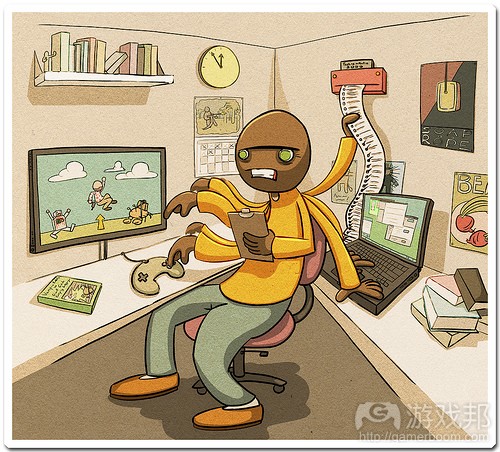游戏公司应如何提升QA人员发展空间?
作者:Richard Wood
QA领域的最大劣势之一,或者最具消极影响的部分在于QA处于入门级别,它是到达更宽广、更美好未来的垫脚石。我并不认同此观点,我相信,此观点会破坏QA部门,从而冲击测试员的职业道德和工作激情,最终导致整家公司的停产。然而这是之后谈及的问题,现在,我只想考虑如何奖励QA团队或者QA成员,因为目前这一部门的工作环境存在较少提升空间。
大多数公司QA的标准发展渠道如下:
外包/临时测试员——全职测试员——QA主管——QA经理
当然,此原则也存在例外情况,然而这是目前广泛认可的传统模式。在高要求的领域内,测试员最初是以临时人员的身份进入,如果他们能够证明自己具备该行业所需的技能,那么他们可以晋升为全职人员。由此,那些一直效力于QA部门的工作人员就有可能发展为QA主管,最终成为QA经理——任务完成。然而,我相信总有办法鼓励这些测试员在QA领域开拓自己的事业,根据他们的工作年限给予一定的奖励。
专业性:
随着测试员对自己的能力更具信心,并且对公司的要求更加熟悉,毫无疑问,他们会对测试过程的某个阶段更具信心。比如对音频测试、整个网页或可用性测试具有较高理解力。随着测试员知识和能力的提高,以及对该领域的深入理解,他们最终会成为该部门的“得力助手”,团队中的知识库。所以,他们可以传授自己的知识,提升周围人员的理解力,提高整个测试团队的“价值”。
专业测试员的更大优势在于他们与开发团队之间的关系与沟通方式。比起较低知识水平的测试员,深谙音频知识的声音测试员能够从专业化的角度同音频部门进行沟通,因此,QA与其它各部门之间建立起良好的沟通渠道。再次,专业测试员能够帮助团队成员完善他们的知识体系,从而提高整个部门对游戏领域的理解力和交流能力。
最后,虽然我提到的是奖励那些有兴趣就职于QA领域的人们,此方法同样可以用于留存那些打算跳槽的测试员,保持他们的工作激情。通过鼓励测试员关注自己精选的领域,同期望的部门沟通,那么员工们可能更具动力,并且能继续对QA部门的目标产生积极的影响。
当然,公司也会对专业测试员产生负面影响,虽然不少公司只会让一个测试员关注一个领域,但并非所有工作室的做法都是如此,对测试员而言,关注产品的其它领域同样重要。而且,具备拙劣的沟通技巧以及无法传授自己知识的测试员会成为部门中的糟糕资源。
额外的提升机会:
如上所述,QA的专业发展有一标准流程。幸好,我就职的这家公司在QA经理这一职位上存在附加“级别”,例如我这种“高级QA测试师”,一个介于QA主管和标准测试员之间的职位。在此职位中,我的工作范畴基本都是QA主管负责的领域,同时,我还需要不时测试游戏及周边需求(游戏邦注:比如网页、账号和订单,等等)。目前,此职位并未让我获得多于手下测试员的工资,但我却可以直接接触到制作人和更高层的管理人员,这使我的责任感提升了10倍。因此,我可以分担顶头QA主管的某些责任,同时可以同手下的测试员进行更多的个人交流。
高级QA这个职位可能对测试员和部门具有奇妙的作用。它为测试员提供了更高层次的职业发展渠道,同时他们还可以进一步了解QA经理职位(如果测试员真的准备好向QA主管职位发展的话)。此外,我发现高级QA测试员这一职位更方便我同测试员与管理部门之间的交流;我亲身实践,了解产品,所以我能够快速回应测试员的要求或疑问;同时,我也可以更方便地同公司内部的高管们交谈,以QA测试员的角度提供他们有关游戏状态的清晰反馈。
QA部门清楚此职位能够分担某些重要任务,那样就不会把全部任务都堆积到某个可怜的领导身上,并让一个沉着冷静的QA团队负责他们擅长的事情。
这些公司不愿意或者不能增加的另一管理职位是“QA前辈”。我坚信,新人了解QA部门工作过程的最佳渠道就是进行职业培训和基准问题测试,他们同经验丰富的QA测试员(即熟悉产品和公司的QA测试员)搭档,着手工作。为何QA部门不能聘任某个专家培训新来的测试员呢?如果能够赋予某个测试员培训新人的责任,那么基本上你就告知他人‘你是个优秀的测试员,我们希望这些新成员能够向你多多学习’,没有比这更好的赞赏方式了。测试员得到赏识,赋予责任训练新成员,这不仅可以为他们的简历加分,积累了经验,同时,整个QA团队也能够通过学习前辈的专业知识和建议,从而不断完善。
多种角色:
再次申明,并非所有进入QA部门的人员都打算永远驻扎这一领域。因此,经理们必须根据测试员在QA工作环境中的生产能力平衡他们的职业抱负。紧接先前的主题,处理此问题的好办法是让他们同自己意向的部门和专业人员进行交谈和互动。
QA团队能够看到整个产品的流程,他们会看到玩法元素同音频和角色动画发生矛盾,出色的测试员会倒退进程,查看完整的产品,评估某些元素是否适合这款游戏,某些元素是否看起来极不相称。
同样,如果时间允许的话,我们可以让QA测试员以“积累工作经验”的角色进入其它部门。允许他们同自己中意的部门互动,同时他们也能互相了解对方的工作性质。
虽然测试员以多种角色存在具有优势,但是QA主管/经理仍必须处理这种方式的某些弊端。测试员可能在接触自己中意的部门工作后,对QA部门大失所望,那样,他们的态度、职业道德和工作结果都会受到影响。
总结
通常在QA部门存在大量有才华且工作努力的测试员,他们需要得到认可,但是部门中只有一个潜在的提升职位。当发生这种情况时,我们必须找到其他方式嘉奖这些表现突出的测试员。确保努力工作的测试员能获得相应的回报,保证他们在部门中的积极效应能持续发展,此外,此方法还可以鼓励团队中的其他成员,提升整个部门的工作效率。(本文为游戏邦/gamerboom.com编译,拒绝任何不保留版权的转载,如需转载请联系:游戏邦)
Rewarding your QA team
by Richard Wood
One of the biggest draws to QA, and potentially its most negative influence, is the idea that QA is an entry level position, a stepping stone to bigger and better things. While I don’t disagree with this thought process, I do believe it can be damaging to a QA department and as such impact a testers work ethic, enthusiasm, and thus consequently the companies finished product. However that’s something to look at in a later article, for the moment I want to look at how to reward a QA team/member when there is little room for promotion in the current working environment.
In most companies the standard route through QA is as follows:
Contact/Temporary Tester – Full Time Tester – QA Lead – QA Manager
There are of course exceptions to this rule, but at the moment this is widely accepted as the traditional set up. Testers initially come in on a temporary contact during the high requirements stage of a project, and can be put onto full time contacts if they prove they have the required skill set. From here, those who remain within the department can move to QA Lead and eventually QA Manager – job done. However, I believe there is ways to encourage those testers willing to carve out a career within QA and reward them throughout their employment period.
Specialisation:
As a tester becomes more confident in his/her abilities, and familiar with the requirements of their company, they will no doubt become more confident in certain areas of the testing process. This could be anything from a strong understanding of audio testing, right through to website or usability testing. Through this increased knowledge and ability to test and understand these areas in depth, these testers essentially become the department “go to guys”, a repository of knowledge within the team. These testers are therefore now able to pass this knowledge on, improving the understanding of those around them and increasing the ‘value’ of a test team.
A further advantage of a specialized tester is their relationship and communication flow between the development team. A tester with sound understanding of audio will be able to communicate with an audio department on a higher level than a tester with below-average knowledge, therefore creating a good communication flow between QA and other departments. Again, this tester can help those within the team to improve upon their knowledge and in turn improve the overall department understanding of a game area, and their communication also.
Finally, while I have spoken about rewarding those interested in obtaining a career within QA, this can also be used to ensure those looking to move to other departments are also kept motivated. By encouraging the tester to focus on their chosen area, and begin communication with their desired department, the employee may become more motivated and as such have a continued positive impact on the QA department goals.
Of course there are negatives to a specialized tester, while many companies will be able to have one tester focus solely on one area, not all studios will, and as such it is important those testers still focus on other areas of the product. Furthermore a tester with poor communication skills and an inability to pass on his knowledge will be a poor resource to the department.
Additional Promotion Opportunities:
As mentioned above, there is a standardised progression path through the QA profession. I was very lucky to work for a company who had an extra ‘Tier’ of QA management and I was given the title of ‘Senior QA Tester’, a position between QA Lead and standard tester. In this role I did a lot of the tasks a QA Lead would do, while also still getting time to actually test the game and its surrounding requirements (website, accounts and billing, etc etc). Now this role didn’t actually pay me much more than the testers below me, but it gave me direct contact with production and higher management, and also increased my responsibility tenfold. As such I was able to remove some of the responsibility from the QA Leads above me, and have a much more personal interaction with the testers below me.
Senior QA positions can be a fantastic role for both tester and department. It provides a more likely level of career advancement for testers, and also gives further insight to the QA manager if a tester is truly ready for an eventual QA Lead role. Furthermore by having a position between tester and QA Lead I found that interaction with testers and management was simply easier; I had a strong hands-on understanding of the product and as such was able to respond to testers requests or concerns quickly, this understanding also made it easier for me to speak to executives within the company, giving them clear feedback on the state of the game from the perspective of a QA tester.
Department wise this role allows the important tasks to be spread out and not all lumped on one poor lead, allowing a calm QA team to simply get on with what they do best – breaking shit.
Another role, for those companies unwilling or unable to add another tier of management, is the role of ‘QA Buddy’. I firmly believe that the best way to learn the processes of a QA department is on the job training and benchmarking, basically get stuck in and be partnered with an experienced QA tester, one already familiar with the product and company. Why shouldn’t a department have an expert in training new testers? By giving someone the responsibility of training new members of the team you are basically telling them ‘You’re a good tester and we want these new guys to mimic you’, there is no better praise. Testers are giving the respect and responsibility to train those new to the role, allowed to add depth and experience to their CV, and QA teams are improved by new starts getting expert knowledge and advice from the word go.
Split Roles:
I’ve said it already, but once more, not all those who enter QA plan to stay there. As such managers need to balance the career ambitions of these testers with their productivity within a QA environment. Following on from the earlier theme, a good way to do this is to get them talking and interacting with the department and professionals they want to work with.
The QA team are able to see a product come together, watching game play elements collide with audio and character animations, as such a good tester should be able to step back and see the completed product, able to gauge if something will fit into the game or if it will look out of place.
As such, if deadlines permit, QA testers could be placed into other departments on a sort of ‘work experience’ role. Allowing them to interact with the department they are aiming to work in, and also giving both the tester and department valuable insight into what the other does.
While allowing testers to have Split Roles has its advantages, there are disadvantages the QA Lead/Manager must manage as well. Testers may become disillusioned with their time in QA after working in their desired department, as such their attitude, work ethic and results may be impacted.
Conclusion:
It is often the case within QA that there will be numerous talented and hard working individuals who deserve recognition of some sorts, but only one potential job opening. When this occurs it is important to look at other methods of rewarding those going above and beyond. Ensuring the hard working testers are appropriately recognised will ensure their positive influence within the department continues, furthermore, this may rub off on the rest of the team, increasing the department productivity levels.(source:gamasutra)









































 闽公网安备35020302001549号
闽公网安备35020302001549号